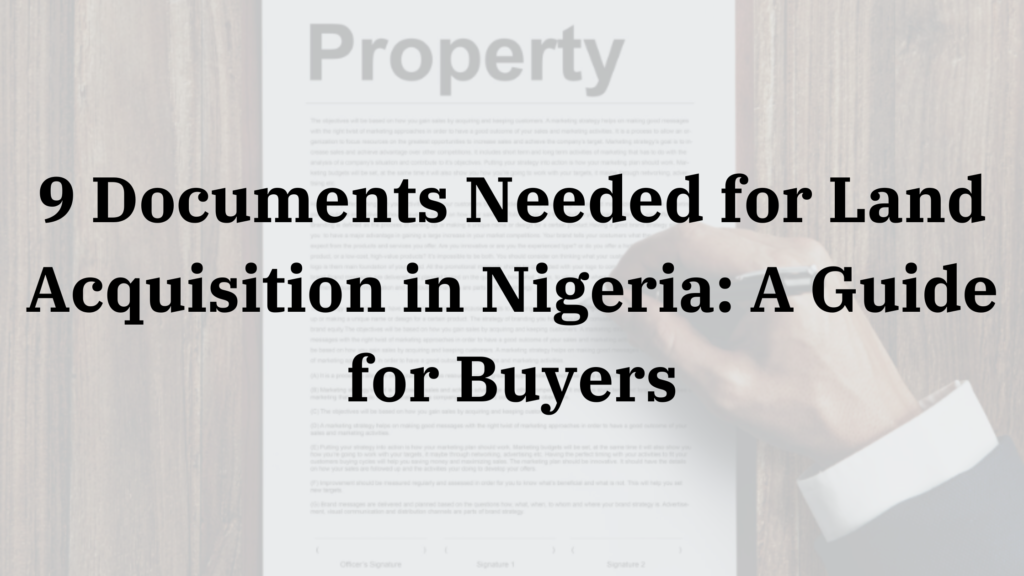Documents for Land Acquisition in Nigeria A Guide for Buyers

When it comes to buying land in Nigeria, understanding the required documentation is critical for a smooth and legal transaction. Whether you’re a first-time buyer or an experienced investor, understanding the essential documentation and legal processes can help you avoid any legal complications and ensure a secure investment. In this article, we’ll go over the nine important documents required for land acquisition in Nigeria, as well as answer some frequently asked questions about the procedure.
The 9 Important Documents Needed for Land Acquisition in Nigeria
1. Payment Receipt
In any land sale, this is a simple yet essential document. It acts as the main documentation proving you have paid for the land. The parties involved provides their information, the transaction date, and the amount paid. As a record of the transaction, this document is important to the buyer as well as the seller.
2. Survey Plan
A Survey plan is a precise representation that displays the dimensions and limits of the land. A qualified surveyor prepares this document, which is essential for ensuring that the land does not intrude on any government-owned land and is not subject to any government acquisition.
3. Deed of Assignment
The transfer of land ownership from the seller (assignor) to the buyer (assignee) depends heavily on this legal document. The document contains names of the parties, property description, terms and conditions of the land transfer, and an acknowledgement that the seller has transferred all land rights to the buyer. The document is often signed in front of witnesses, for further legal validity
4. Certificate of Occupancy ( C of O)
A legal document that certifies land ownership is called a Certificate of Occupancy, and it is issued by the state government. In urban settings, this paper is very essential. As a result, the land reverts to the state after the landowner’s leasehold interest expires, typically after 99 years in Nigeria. The cost of obtaining a C of O can vary greatly depending on the state and the size and location of the land.
5. Governor’s Consent
Any transaction involving land that already has a Certificate of Occupancy must have this. The Land Use Act of 1978 requires the Governor to agree to any future transactions on such land. This legal criterion guarantees that the transfer of ownership is recognized by the state and authorized.
6. Awareness of the Land Use Act of 1978
This Act is a cornerstone of Nigerian law pertaining to land ownership. The Land Use Act of 1978 vests all land within a state in the state governor and specifies how land rights can be awarded, transferred, and canceled. For everyone concerned in land acquisition in Nigeria, understanding this Act is essential.
7. Power of Attorney
This is a legal document that gives someone the authority to handle real estate transactions on behalf of another. It becomes important in the event that the buyer or seller is unable to undertake or finish the land transaction operations in person. The Power of Attorney should be clearly drafted, stating the specific powers granted and the duration of these powers.
8. Tax Clearance Certificate
This certificate serves as evidence that the land seller has paid all applicable taxes on the property up to the transaction date. It is a crucial document for the buyer because it guarantees they won’t inherit any tax obligations from the sale.
9. Contract of Sale
The Contract of Sale is a legally binding agreement between the buyer and seller detailing the terms and conditions of the land sale. This document should include a comprehensive description of the property, the agreed-upon price, payment terms, obligations of both parties, and any other conditions pertinent to the sale. It provides a clear framework for the transaction and helps to prevent future disputes.
Conclusion
Understanding and obtaining the right documents is fundamental to a successful land acquisition in Nigeria. This guide aims to provide clarity and assist you in navigating through the process. However, it’s always advisable to consult with legal experts and real estate professionals to ensure all aspects of your land purchase are legally sound and secure.
We are here to help you throughout your Real Estate journey.
Click here to Get started Today!!!
Frequently Asked Questions
How many documents are required for land purchase in Nigeria?
Typically, at least six documents are essential, this includes survey plan, deed of assignment, receipts, tax clearance certificate, Certificate of Occupancy, Governor’s consent and contract of sale
What is the document of land ownership in Nigeria?
The Certificate of Occupancy (C of O) is the most recognized document of land ownership in Nigeria.
Do I need a lawyer to buy land in Nigeria?
Do I need a lawyer to buy land in Nigeria?
While it’s not a legal requirement, having a lawyer can help navigate the complexities of land transactions and ensure all documents are in order.
How much does C of O cost in Nigeria?
The cost of acquiring a Certificate of Occupancy varies by state and the size of the property. For instance, In Anambra State, the cost can vary greatly, so verify with the local land register.
What is the full meaning of C of O in the land?
The term “C of O” stands for Certificate of Occupancy. It is a legal document issued by Nigerian state governments to landowners to prove ownership.